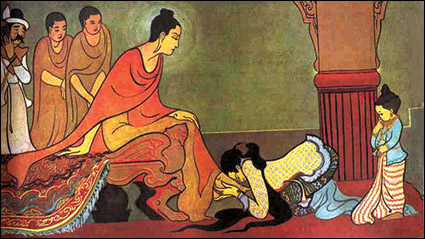Grim Pleasures
 May
all the forest fruits for you turn sweeter, May men surround you as the
bees a flower, May the sun’s scorching rays for you get dimmer, And
league after league, may heavenly halls appear. (Yasodaravata,
translated by Ranjini Obeyesekere) Mourning is universal, its rituals
manifold. Among them, one of the most interesting and least understood
is lament. May
all the forest fruits for you turn sweeter, May men surround you as the
bees a flower, May the sun’s scorching rays for you get dimmer, And
league after league, may heavenly halls appear. (Yasodaravata,
translated by Ranjini Obeyesekere) Mourning is universal, its rituals
manifold. Among them, one of the most interesting and least understood
is lament.
Yasodaravata (Yasodara’s Lament) is the greatest available lament in
Sinhala literature. Yasodaravata is a folk poem. It has often been sung
and recited along with Vessantara Kavya in houses especially on the
occasion of a funeral to drive home the truth that death is inevitable.
I have heard it has been also recited in temples. Yasodara is the name
in Buddhist literature of the wife of Prince Siddhartha who later became
the Buddha.
Yasodhara went through samsara, the endless cycle of existence with
Bodhisattva. When the Bodhisattva Siddhartha decided to renounce the
world in his quest, he leaves his wife and newborn son behind. Yasodara
grieves and laments with despair, but at the same time struggles to
understand and accept the larger cause that made her husband pursue the
course he did. My moon-like lord who partook of fragrant foods That I
wish special flavouring made for you.
May fragrant herbs now sprout in the forest for you And scented
flowers bloom for my lord of gold. (Obeyesekere’s translation) When we
speak of lament, we are speaking of many genres. A lament is an
expression of mourning, but it is not necessarily mourning for the dead.
|
Interesting bibliography |
* Pattini
Hella
* Kuveni Hella
* Vessantara Kavya
* ‘Dangerous Voices: Women’s Laments and Greek Literature’
|
|

Yasodhara touching the Buddha’s feet. www.samakkhi.ac.th |
A whole class of laments, including those of the biblical book of
lamentations, is songs for the fall of great cities. In cultures where
forced emigration is common, we often find laments either for those who
have gone into exile or composed by émigrés for the homeland and family
they have left behind.
Yasodara’s figure is not presented prominently in Sri Lankan Buddhist
literary canon. But her shadowy figure continuously fascinated the
imagination of creative thinkers over centuries.
Many retellings of the story of Yasodara in both prose and poetry by
monks as well as laymen are proof of this fascination.
The story of Yasodara has been taken as a model to represent women
who are suffering from the loss of their loved ones. This unique piece
of folk literature offers a lesson of tolerance, love and acceptance.
Women get the direct consequences of the loss of a loved one by being
isolated or financially crippled. And that feeling is universal and
cannot be evaluated according to the culture that woman belong.
With the translation of the Yasodaravata into English by Prof.
Ranjini Obeysekera, a long-felt need for the ‘The Story of Yasodara’ in
English was fulfilled. She has also written a comprehensive introduction
to her translation. In that, she provides some important points to
ponder in this piece of literature.
‘The emotional balance of the poem comes from the play between the
two parallel sections in the narrative poem. One which describes the
pain of parting the Bodhisattva feels as he goes to see his sleeping
wife and newborn son before his final departure, and the other which
describes Yasodara’s grief at his departure’.
The Yasodaravata is today both a popular folk poem and sung as a
funeral lament in villages. Most of the Sinhala laments are based on a
story of a woman. One such lament is associated with the rituals for the
goddess Pattini. There is a section in the Pattini Halla (The Tale of
Pattini) where the goddess find her husband killed by the evil king of
Madurai and chants verses of lament as she weeps over his dead body.
These verses are often sung in the Pattini rituals. Similarly there
is the lament of Kuveni (Kuveni Hella). Kuveni, the legendary queen of
island of Lanka helped Vijaya, who was exiled from India to become the
ruler of the island. But later she was cheated by Vijaya by importing
‘queens’ from India. In Vessantara Kavya, there is again a lament of
Madri Devi, the wife of King Vessantara. She mourns the loss of her two
young children, who was given away by their father. |



